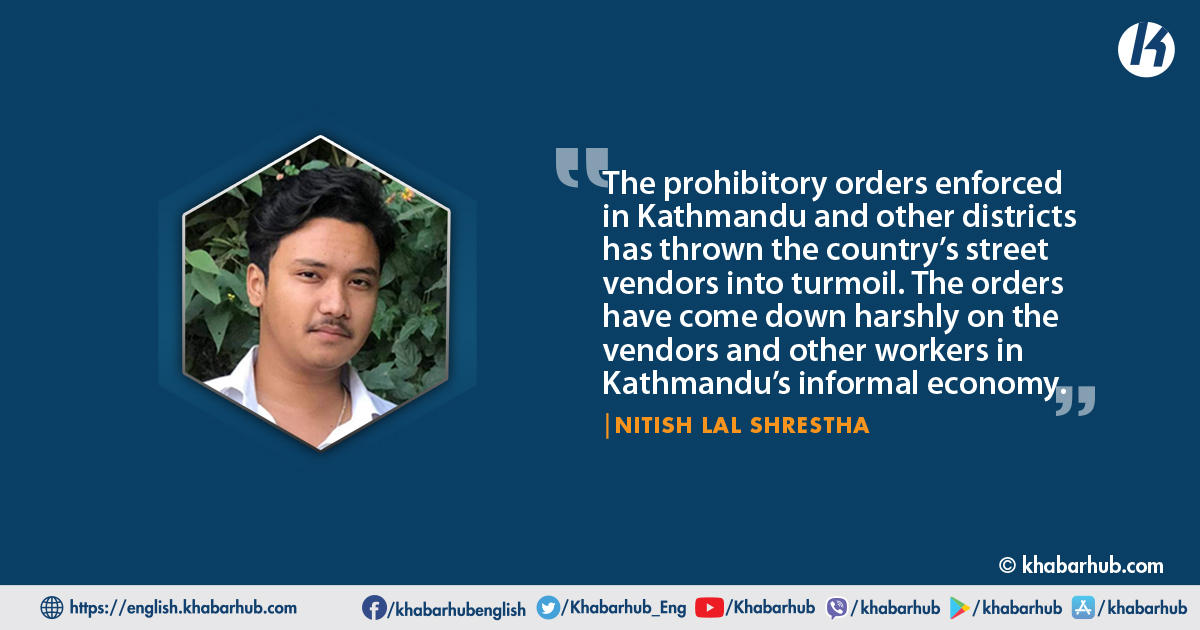Prohibitory orders imposed in Kathmandu and elsewhere have thrown the country’s informal workers into turmoil – with street vendors particularly hard hit.
People, who entered Kathmandu in search of a better life owing to lack of employment and poverty in the villages, have been currently confronting with hunger and deprivation.
These migrants lack the skills and qualifications necessary to pursue better-paying, more stable jobs in the formal sector, so they end up settling for work in the informal sector.
This group of low-skilled rural migrants is found in most Asian countries. It’s more usual in Nepal because we don’t have a large manufacturing base and the country has not been able to generate enough employment for these people.
As a result, the informal sector has been growing each day posing more challenges to the government.
Street vendors play a key role in the urban economy, providing essential goods to households with average incomes. In a more comprehensive approach, backward groups engage in street entrepreneurship and market low-cost products to people from similar backgrounds.
Kathmandu has long been a city of hope and a workstation for those working in the informal sector, especially the street market.
Street vending now has become a part of our culture, not only in Kathmandu but in many places of Nepal. Due to its practical features such as low investment, easy set-ups, cost-effectiveness, and self-employment, street vending has become increasingly popular in Kathmandu among other places.
Street vendors in the city can be seen selling anything to everything even on the busiest of walkways. For many city folks, selling goods on the streets has emerged as the best alternative means of making a living amid the increased unemployment.
It is also an excellent option for entrepreneurs due to the low ability requirements and low financial investment.
However, since street vending has provided economic opportunities for thousands of families, the government should undertake proper management and formalization of these street businesses.
Street vendors play a key role in the urban economy, providing essential goods to households with average incomes. In a more comprehensive approach, backward groups engage in street entrepreneurship and market low-cost products to people from similar backgrounds.
In Kathmandu, street vendors; especially street food has emerged as a unique and successful informal branch of business.
After 8 p.m., you’ll find a slew of street vendors selling momos, sekuwa, and other famous dishes in the Baneshwor area.
The number of people queuing for food has also risen, indicating the opportunity to formalize and manage the street food tradition.
In light of these developments, rather than erecting legal barriers to prohibit street vendors from selling their wares, the government should pursue a solution that allows vendors to prosper in the long run without obstructing traffic or causing public complaints.
Despite being a thriving business that plays a significant role in the economy regardless of economic boom or recession, these businesses are frequently informal.
The government has no idea how many vendors there are in the area, and there are no designated vending zones or locations in the city.
Apart from a few unofficial codes, there are currently no specific laws in Nepal governing street vending. As a result, the street vendors are often threatened by the authorities. We often witness the municipality taking frequent actions against the street vendors.
One of the reasons behind it is that the street market has resulted in encroachment and traffic congestion on the roads. Many pedestrians in Kathmandu have repeatedly complained that unruly street vendors cause traffic congestion and block vehicles and sidewalks.
Malaysia is noteworthy for being one of the few Asian countries to recognize street vendors in some way. Malaysia’s National Policy on Hawkers was developed in 1990.
However, since street vending has provided economic opportunities for thousands of families, the government should undertake proper management and formalization of these street businesses.
Despite, organizing the street market has been discussed for a long time, no action has been taken as such to date.
Now, due to the government’s lockdown during Covid-19, street vendors are among the most impacted, however, no one is available to assist them since they are unregistered businesses.
Street vendors used to earn approximately 15,000-20,000 per month which is disrupted now due to lockdown.
They had the same problem during the lockdown last year, however, they did not receive any assistance from the government.
This has made it even more difficult for the mentioned community of people to meet even their most basic needs. This time, the scenario is the same.
Hence, now is the best time for the government to consider organizing the street market and, more specifically, formalizing it in a more realistic manner that benefits all sides.
Along with handling the Covid-19 crisis, it’s also essential to manage these people and their businesses, as hunger has posed a much greater threat to them than Covid-19.
There are various countries where street vendors have been formalized by the government and the county has reaped the benefits. For instance:
Thailand
Bangkok’s one of most prominent things includes its street vendors. Almost every street in this city has a street vendor selling a variety of goods a wide range of cooked and raw foods.
The vending business is expected to increase in the coming days as the ongoing lockdown is expected to last longer, increasing unemployment in the economy.
Bangkok’s street vendors are well-known for their low-cost, high-nutrition fare. Food stalls, especially makeshift restaurants, are an important part of life in Bangkok for the locals.
Bangkok’s municipal authorities have designated areas where street vendors can work and notably in Bangkok, there are 287 such locations. Similarly, there are 14 locations on private property as well.
Malaysia
Malaysia is noteworthy for being one of the few Asian countries to recognize street vendors in some way. Malaysia’s National Policy on Hawkers was developed in 1990.
This is a holistic strategy for addressing the social and economic issues that come with street vending. Its implementation involves funding for credit schemes and training programs for street vendors to help them improve their facilities.
The department of hawkers and petty traders was created in 1986 to regulate and monitor street vendors. The department’s goals include the growth, modernization, and management of street vendors to make Kuala Lumpur a safe, healthy, and beautiful city for residents and tourists.
Way Forward
Street vendors are an integral part of the informal economy, because of the critical roles they perform in maintaining it.
Moreover, they market a large number of products manufactured by small industrial units in the informal sector.
The vending business is expected to increase in the coming days as the ongoing lockdown is expected to last longer, increasing unemployment in the economy.
If this is to be ignored, the street vendors will be more mismanaged causing more problems. Hence, the government must be ready with a plan to formalize and manage these businesses.
They will be able to run their businesses without the risk of being evicted, as well as protect their property rights and gain access to structured financing.
This problem could be solved by allocating a vending zone and properly managing these markets. This would mitigate the issue of encroachment, as well as problems for pedestrians and the city’s growing traffic.
Similarly, the current state of street vendors would be significantly enhanced by formalizing them and getting them into the tax system.
The government’s general goal has been to raise more revenue by increasing the tax rate, but it hasn’t focused on expanding the sectors from which revenue can be raised.
The government could raise a significant amount of revenue by legalizing street vendors and bringing them into the tax system, which would be a blessing to all street vendors.
They will be able to run their businesses without the risk of being evicted, as well as protect their property rights and gain access to structured financing.
These are essential characteristics for any type of company to scale up. This can be beneficial in a wider sense since it is evident that tourists enjoy street markets. It would be a win-win situation for both the government and the street vendors if this were to happen.









Comment